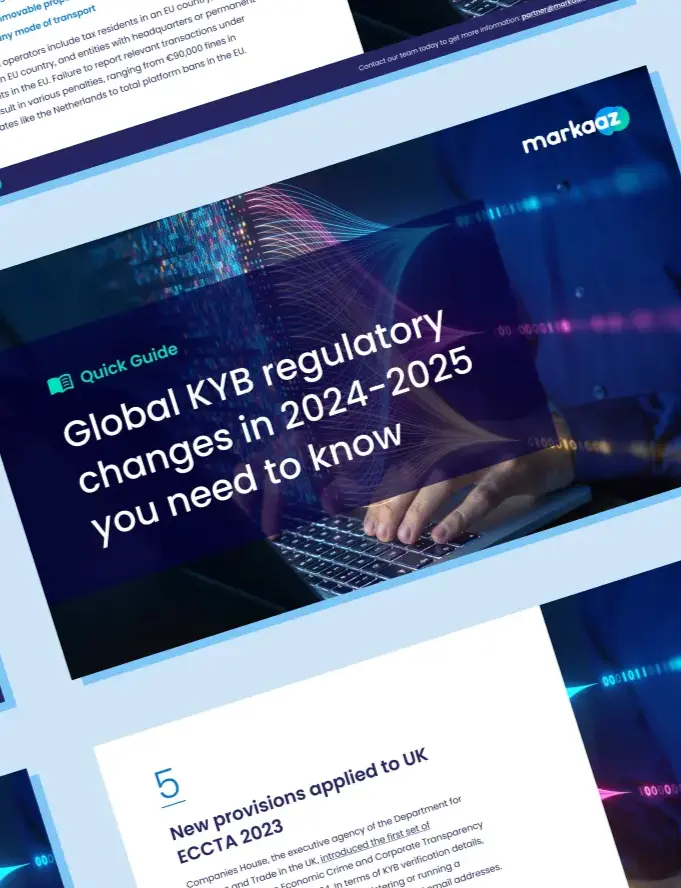Financial crimes, such as money laundering, fraud, and terrorist financing, are a pervasive problem worldwide. Fraud alone costs organizations approximately 5% of annual revenues, draining billions from the global economy each year.
Effective business verification significantly improves risk management, acting as a first line of defense against financial crimes. The process involves analyzing and validating firmographic data and other information to confirm the business is legitimate and in compliance with legal requirements.
However, data gaps and deficiencies in the business identity verification process can create significant vulnerabilities. By identifying discrepancies or suspicious details, business verification helps companies avoid entanglements with fraudulent entities, minimizing risk and creating a safer business environment.
The role of business verification in AML and risk management
Business verification, also known as Know Your Business (KYB), is the process of confirming the legitimacy of commercial entities before engaging in financial transactions or partnerships. Key components include:
- Firmographic information
- Legal status verification
- Verification of operations
- Financial stability verification
- Company officer verification
- Business financial risk review
KYB business verification helps prevent fraud and financial crime. Done effectively, it ensures adherence to anti-money laundering (AML) regulations, minimizes risk, and protects the integrity of the global financial system.
The process includes determining whether the organization is actively and legally operating at the claimed addresses and whether it is associated with sanctioned entities or jurisdictions. It typically involves multiple steps, including reviewing business information databases and official government registries, conducting onsite audits and inspections, and using trusted business verification services.
Roadblocks to effective business identity verification
Data inconsistencies and obscured information frequently create verification challenges. Discrepancies across registration documents, directories, and websites lead to mismatches that often stall verification efforts. Minor variations in addresses, spellings, and operating names, and errors like typos or incomplete entries further complicate the confirmation process.
Increasing globalization adds a layer of complexity. When companies operate across borders, confirming the legitimacy of subsidiaries requires working with various jurisdiction rules and registration systems. Jurisdictions with low transparency, also known as secrecy jurisdictions, create additional risks. They’re known for laws and structures that allow for opaque registrations, under-regulation, and other loopholes that make it difficult to verify business information and easier to move and hide illicit money.
Then, there are online businesses with no physical presence. As internet-based businesses become more common worldwide, their digital footprints can spread across servers and domains, potentially obscuring critical identifying details.
Data gaps and their impact on business security
Data gaps undermine the business verification process, potentially creating security vulnerabilities. Inadequate business information may allow nefarious actors to mask illicit dealings behind seemingly legitimate enterprises. The following types of data gaps are problematic for entities trying to shield themselves against financial crimes:
- Unverified or outdated registrations: Stolen, fake, or out-of-date company registration documents can be used to create shell companies as a front for illegal businesses.
- Incomplete financial records: Missing or contradictory financial statements, tax filings, bank records, or cash flow reports can hide revenues from illegal activities or obscure insolvency risks.
- Insufficient operational details: A lack of information regarding revenue sources, inventory, or supply chains can mask the illegal trafficking of merchandise, conceal the flow of black market goods, or allow a shell company to pose as a legitimate supplier.
- Hidden beneficial ownership: Missing or false data regarding the individuals who control or profit from entities may allow for the concealment of illicit activity, fraud, or noncompliance.
Notable examples of verification failures resulting in financial crime
While business verification breakdowns can impact organizations of all sizes, instances such as The Panama Papers and the Danske Bank AML scandal bring to light the scale and scope of damages that can result from failures in company identity confirmation.
The Panama Papers
A massive leak of over 11.5 million encrypted confidential documents, known as The Panama Papers, exposed over 200,000 tax havens involving public officials, entities, and wealthy individuals from more than 200 nations. Many of the documents revealed the setup of shell corporations that were used for tax evasion, fraud, or avoiding international sanctions. Since these activities occurred in secrecy jurisdictions, they were virtually impossible to detect prior to the leak.
Danske Bank
Danske Bank, the largest bank in Denmark, recently pled guilty to money laundering charges and agreed to forfeit $2 billion to the US following one of the world’s largest AML compliance scandals. It also owed $413 million in penalties to the Securities and Exchange Commission (SEC), as well as additional settlements with Danish authorities. The bank admitted that its compliance team failed to address multiple gaps in its business monitoring and risk management processes. As a result, suspicious transactions totaling approximately $200 billion flowed through the international financial system.
As part of the plea agreement, Danske Bank admitted several significant failures, including claiming it had automatic AML monitoring software and sanctions in place when it was, in fact, still relying on manual monitoring and form-based compliance questionnaires. Using a reliable, technology-driven data verification company could have minimized the bank’s risks, allowing it to detect indicators of financial crime in real time.
Leveraging tech for effective risk management
Technology is increasingly playing a critical role in strengthening the business verification processes for organizations of all sizes. Often, there are billions of data points for a single business spread across multiple databases. While the data may be similar, small differences in names, addresses, and spellings are common.
Entity resolution is the process of identifying and linking these records by recognizing when they refer to the same real-world company, even if details don’t perfectly match. By correctly matching and aggregating this information, B2B data providers and KYB solutions can significantly improve positive verifications and enhance due diligence. This creates efficiencies and reduces the potential for human error. Ongoing monitoring further improves data integrity, providing real-time updates as changes occur.
With a proprietary global database of over 300 million businesses, Markaaz makes it easy to verify hard-to-identify companies, helping users stay in compliance and effectively manage the risks associated with financial crimes. Innovative matching algorithms reduce false rejections and allow accurate verifications in seconds. Adding Markaaz to your existing KYB waterfall or replacing standard AML software with Markaaz’s advanced verification solutions allows users to make timely, informed decisions backed by an extensive collection of validated records.
Prevent financial crimes by closing data gaps
Data gaps and business verification challenges create significant opportunities for criminals to engage in illicit activities, exposing organizations to compliance and security risks. Markaaz helps close these gaps with the industry’s most robust directory of extensive B2B data.
Connect with our team to learn how Markaaz can help safeguard your organization from costly financial crimes.



